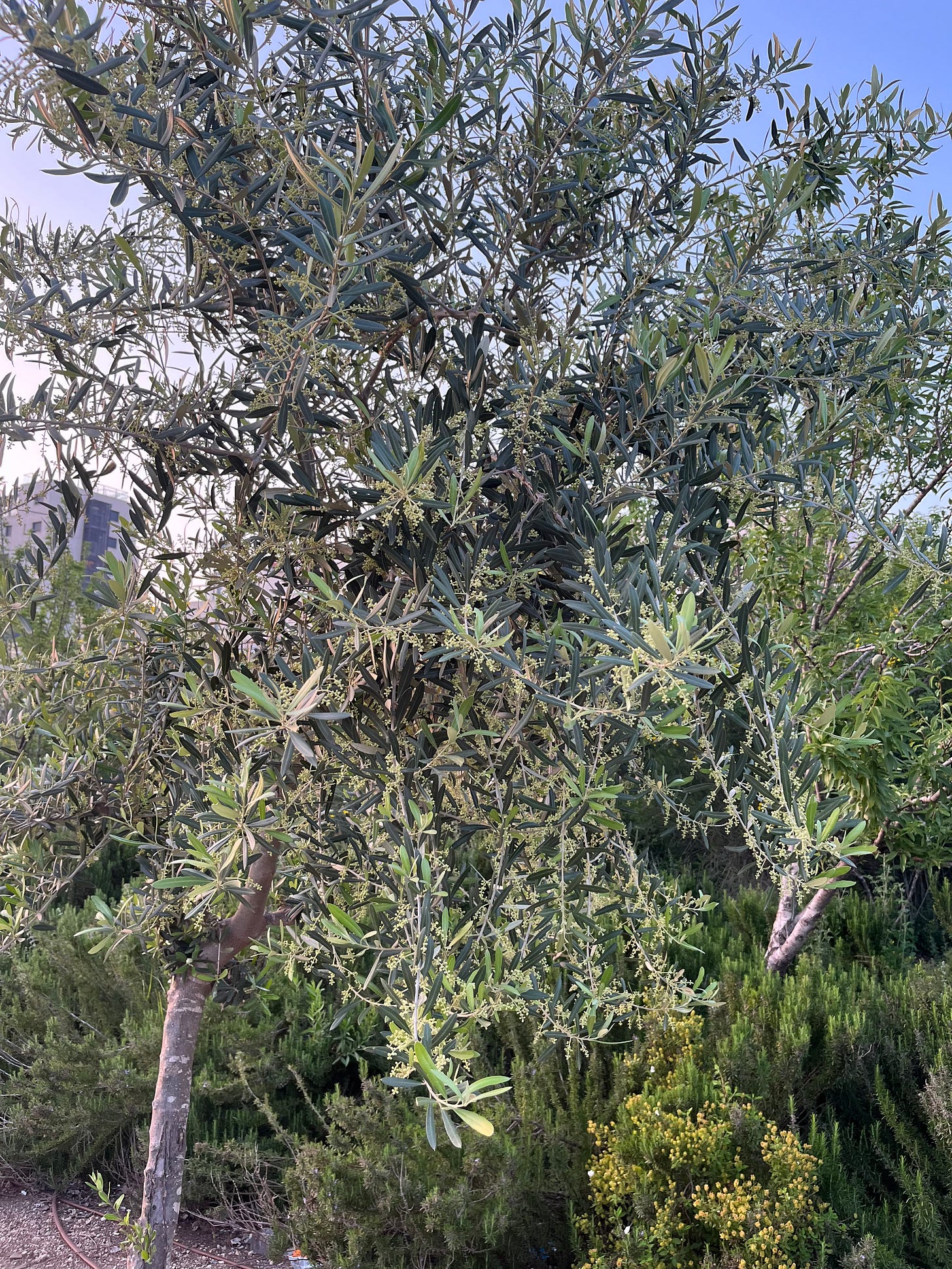On Seder Night, Eat Like an Olive
The olive teaches healthy Jewish eating - in quantity and quality.
Dear Healthy Jew,
After I shared with you last week about the lifestyles of chometz and matzah, today we’ll zoom out to appreciate Pesach’s general message about eating well. This is one of healthy Jewish living’s more important principles, so feel free to pass it on.
I’m also excited for lots of upcoming foraging walks. The next two weeks are mostly booked solid with private walks, but I’m planning an open walk right outside of Ramat Bet Shemesh for Sunday, April 28 from 11am-1pm. For more details and to register, write to contact@healthyjew.org. (Please DO NOT only respond to this email, because I won’t be checking it regularly over the holiday!) (If this walk fills up, there will be another option for Tuesday, April 30.)
Finally, a friendly reminder that the reason the Jewish people left Egypt was to travel to Israel. Really? Who says? And why do we need a land? Look at all the troubles it’s causing us now! I answer all these questions, and much more, in my new book, Land of Health: Israel’s War for Wellness. It’s available on Amazon, bookstores in Israel, and directly from me in Ramat Bet Shemesh.
May you have a joyful and meaningful Pesach!

Pesach is a lot about food: matzah and not chometz, maror (bitter herbs), charoses (a spread made from apples, dates, nuts, and spices), four cups of wine, and heaps of meat in honor of the holiday.
Even before pondering each food’s message and laws (as we did a bit last week regarding matzah and chometz), Pesach teaches an important principle of Healthy Jewish living: not only our body is nourished by healthy food, but our soul too, at least for these 7 days, thrives on its own special diet.
Healthy Jews won’t be terribly surprised to learn that physical food affects the spiritual soul, because we’re already striving to eat well for a greater purpose - not only to make good living possible, but because taking care of ourselves is where all good choices begin. As the Rambam (Maimonides) taught us, we become genuine human beings when we use our minds to guide our bodies’ actions for the purpose of finding wellness.
Once all eating is a spiritual endeavor, Jewish tradition teaches that eating specific foods can nourish (or damage) us in specific ways beyond their apparent nutrient profiles.
Many years ago, I learned a beautiful Chassidic insight about the spiritual aspect of eating.
In Jewish law, the threshold for both obligated and prohibited eating is the size of an olive. Therefore, comes Seder night, Jews will measure their matzoh and maror according to various opinions of how to measure an olive. (Yes, it’s not that simple!)
The holy Apter Rav (1748-1825) taught his students to listen carefully to the oft-repeated Talmudic measurement, “like an olive,” and hear how the essence of Jewish eating is akin to an olive.1
Eating olives, taught the Talmud, causes forgetting (don’t ask me how), but olive oil supports memory (also no clue how). What’s the message? The olive’s external body weakens the mind, but its hidden oil strengthens it.
All food, indeed, is eaten “like an olive.” At first glance, food nourishes only the body; eating even distracts from spiritual pursuits (believe me I know). But every food also hides opportunities:
Eating well enables our mind and heart to understand and emulate God with health, wholeness, and joy.
Some foods, either always or at certain times, affect our spiritual health in ways we can’t see under the microscope, for better and for worse.
So when we transition tomorrow night into Pesach living, let’s not allow profound meanings and detailed laws to distract us from actually eating matzah, maror, charoses, and drinking four cups of wine. The “oil” of their many “olives” isn’t only an inspirational idea. It’s hidden inside the food itself, nourishing our bodies and souls together.
Eating bitter herbs isn’t a reminder on our phones (ping!) to “never forget” the bitter slavery of millennia ago, but actively experiencing the discomfort of slavery in Egypt.
Drinking 4 cups of wine isn’t only a cute connection to the Torah’s 4 terms of salvation, but an active experience of raising our cup in joyous victory and freedom.
Eating matzah doesn’t only commemorate the interesting fact that Pharaoh rushed us out of Egypt, but is our active experience of the Exodus every year.
So whenever the Torah tells us to eat - whether it’s the special Pesach foods, any Shabbos or festival, or even just a regular day - let’s actually eat, body and soul in harmony. When eaten with purpose and dignity, every single “olive” holds its own special “oil.”
Thank you for reading Healthy Jew.
Here are 2 great paths to continue the journey:
Also check out this intro and index to explore hundreds of posts about our 3 Healthy Jew topics: Wellness with Wisdom, Land of Life (Israel), and Sensible Spirituality.
Finally, always feel free to reach out here with any comments, questions, or complaints:
I look forward to hearing from you!
Be well,
Rabbi Shmuel Chaim Naiman
Ohev Yisroel, Likutim, s.v. shiur. See also Avodas Yisroel to Avos 3:4.







